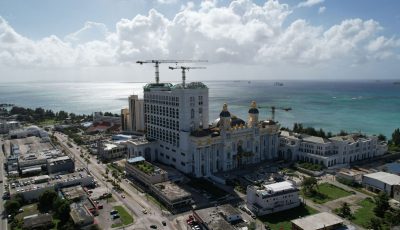Gambling debt cripples Macau ‘junket’ model
The following article was published in the Japan Times recently. It speaks volumes what happens when a major scaffold losers its strength at the base in the Chinese gambling hub.
MACAU (Reuters)—Companies that connect China’s wealthy gamblers to Macau’s casinos are waiting as long as a year for gamblers to repay billions of dollars of loans, crippling the business model of an industry that sustains the world’s biggest casino center.
These “junket” businesses, which lend to high rollers and operate private gambling rooms, normally collect within 30 days and charge interest rates as high as 3 percent per month on overdue balances, according to Macau-based junket consultant Tony Tong.
Now the junkets are on the hook for a surge in bad debts as China’s economic slowdown and a corruption crackdown keep some VIP gamblers away. With little access to credit and slow repayments, the money isn’t flowing.
“The business model looks near-broken,” said Philip Tulk, an analyst with Standard Chartered in Hong Kong.
Heng Sheng, one of the largest junket operators, told investors in October that 30 percent of the outstanding debt owed to its agents was over a year old, according to notes taken by a participant at a private conference. Many gamblers are making monthly installments rather than the normal practice of paying in full.
It is difficult to establish how much credit these junkets extend, because much of the business is done informally, but one Hong Kong-based analyst at an international bank estimated there was 100 billion Hong Kong dollars ($12.9 billion) of outstanding debt.
China limits the amount of yuan that citizens can take out of the country. Junkets serve as a conduit by lending Hong Kong dollars or Macau patacas, which are both accepted in the casinos.
This system insulates casino companies from credit risk, and helped propel Macau revenues to $45 billion last year—seven times Las Vegas’s take. Macau’s revenues are on track to fall 1 to 2 percent this year, well off last year’s gain of 19 percent.
Without a healthy junket industry, casino operators such as Las Vegas Sands Corp. and Melco Crown Entertainment would have to rely on mass-market gamblers or extend VIP credit directly—a practice that has led to write-offs in places such as Singapore, where junkets are tightly restricted.
Wealthy coal baron Lu Zhong Lou is one example of how the junket business can go wrong. Ranked among China’s wealthiest tycoons by Forbes, the 49-year-old from Shanxi province frequented luxurious casinos, including Wynn Macau’s caramel-hued VIP parlors and Galaxy Entertainment Group’s diamond-encrusted saloons, according to six people familiar with his gambling habits.
He owes junkets and Chinese businessmen as much as HK$3.5 billion ($451 million), according to his creditors and local media.
Junket operators say not all lending is recorded in contracts, and Lu’s tally may also be inflated by interest and by side betting, an illegal arrangement between a gambler and junket operator in which every dollar bet actually represents as much as 20 times more.
In a series of phone calls with Reuters, Lu initially agreed to speak to a reporter about the gambling debts but then declined. Ji Jin Wu, a legal representative for Lu, said he was unable to comment without Lu’s permission.
Lu’s creditors said his wealth and influence made it especially difficult to collect, and local media reported in October that two of his creditors were detained by Chinese authorities for reasons unclear.
“Currently it is hard enough to collect debt from low-ranking state executives, let alone for the higher-ranked ones. How do you pressure them? You can’t. You have to write it off,” said Peter Wong, director at Total Credit and Risk Management Group, which helps businesses recoup debt.”
Investing in our people
For 30 years I’ve quietly reviewed the issue of investments in indigenous public land, specifically how the foreign-investment paradigm benefited us beyond dirt-cheap land leases.
Since its inception the focus of discussion has been about money and menial jobs. After set fees are formalized and paid, the interest of benefactors (indigenous people) fades like objects in the rearview mirror. We don’t return to revisit it until the term of the lease nears expiration.
The issue reminds me of the marshmallow test. The head of the study team places a piece of the candy in front of about five young students. Nothing was said but simply a keen observation what would they do with it.
Some quickly grabbed and gobbled the sweet stuff. The others took their time until they are sure it was okay to eat it. Through the years, students who devoured the candy struggled to earn a living. The more thoughtful bunch succeeded! Perhaps we have been gobbling one too many marshmallows!
Understandably, our easygoing island nature didn’t prepare us to go beyond linear thinking into the analytical level. Thus we struggle with the inability to see issues beyond their face value in order to make what’s known as “paradigm shift” or the way we do things. After endless bouts with such cultural anomaly it’s time to retreat to reassess our journey.
But what must be opened for discussion with anchor investors? We must not demand but explore meaningful partnerships and their assimilation into our island community. A partnership fosters making indigenous employees your natural ambassadors. It’s a matter of granting your employees confidence in their future!
What about the rest? Education and the health of our people are vital for the future success of strong NMI governance. This is where you could gradually funnel money as a matter of commitment to help local students and trainees here and abroad in pursuit of strong academic and skills acquisition. Call it investing in our people!



























